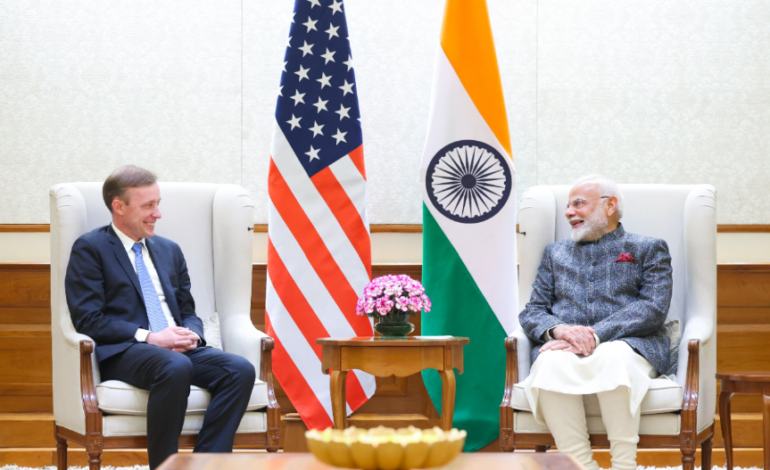
PM Modi receives letter from President Biden, affirms commitment to solidify India-US partnership
New Delhi, Jan 6 (IANS) – Prime Minister Narendra Modi on Monday asserted that the India-US Comprehensive Global Strategic Partnership has reached new heights, particularly in technology, defence, space, biotechnology, and Artificial Intelligence (AI).
PM Modi made these remarks after meeting with outgoing US National Security Advisor (NSA) Jake Sullivan, who was in New Delhi for a two-day visit before concluding his trip.
“It was a pleasure to meet the US National Security Advisor Jake Sullivan. The India-US Comprehensive Global Strategic Partnership has scaled new heights, including in the areas of technology, defence, space, biotechnology, and Artificial Intelligence. I look forward to building upon this momentum in ties between our two democracies for the benefit of our people and global good,” PM Modi posted on X after the meeting.
According to the Prime Minister’s Office (PMO), PM Modi and Sullivan “positively assessed” the significant advancements in the India-US partnership over the last four years.
PM Modi reaffirmed his commitment to strengthening the close cooperation between the two nations and “deeply appreciated” a letter from President Joe Biden that was handed over by Sullivan during the meeting.
“Recalling his various meetings with President Biden, including during his visit to the US in September 2024 for the Quad Leaders’ Summit, PM Modi appreciated President Biden’s contributions to strengthening the India-US Comprehensive Global Strategic Partnership, which leaves an enduring legacy,” the PMO statement read.
PM Modi also conveyed his best wishes to President Biden and First Lady Jill Biden.
Earlier in the day, Sullivan met with External Affairs Minister (EAM) S. Jaishankar to discuss various strategic, regional, and bilateral issues.
“Delighted to meet US NSA Jake Sullivan in New Delhi today morning. Continued our ongoing discussions on deepening bilateral, regional, and global cooperation. Valued the openness of our conversations in the last four years. Appreciated his personal contribution to forging a closer and stronger India-US partnership,” said EAM Jaishankar.
Both sides held discussions on issues including the Initiative on Critical and Emerging Technologies (iCET) during Sullivan’s stay in the capital.
The White House had stated over the weekend that Sullivan was visiting India “for a capstone meeting” with Indian National Security Advisor Ajit Doval to discuss a wide range of issues in the India-US partnership, including space, defence, strategic technology cooperation, and shared security priorities in the Indo-Pacific and beyond.
“This will be Mr. Sullivan’s final trip to the Indo-Pacific region as National Security Advisor. He’s very excited and looking forward to these conversations at this critical time,” said White House National Security Communications Advisor John Kirby.
Sullivan’s visit took place just before US President Joe Biden’s departure from office on January 20, ahead of Donald Trump’s swearing-in as the 47th president of the US.
Both NSAs acknowledged that the iCET, unveiled by Prime Minister Modi and President Biden in May 2022, would play a crucial role in deepening the strategic partnership between the two countries.
In June 2024, during an iCET roundtable, NSA Doval highlighted the importance of India and the US staying at the forefront of technology—especially in AI, semiconductors, biotech, and other emerging technologies— to protect and defend their value systems.
“iCET has achieved more than we could imagine,” said Doval, noting the progress made across the defence innovation roadmap and startups while emphasizing the importance of the growing semiconductor industry.
Sullivan also mentioned three key areas for technology partnerships—innovation, production, and deployment—and stressed the need for government support for the private sector.
“There exists bipartisan support for Indian industry in the US, and building the ecosystem and supply chain manufacturing is key to production,” he said.
“The core of iCET is about India and the US supporting each other, encouraging greater collaboration in the technology ecosystem, jointly innovating, and finding solutions to challenges,” Sullivan added.